The damage of alcohol to the human body can carry a large part. People who drink put physical and mental health at risk - internal organs suffer, the work of the most important systems that control the human body is irregular (the influence of alcohol on the immune system is very dangerous), personality deterioration occurs, which due to its effect on the human nervous system.
The effects of alcohol on the body affect:
- Heart;
- The brain;
- Nervous and psychic systems;
- Cardiovascular system;
- Kidney;
- Digestive system;
- The immune system;
- Muscles and joints;
- Endocrine system;
- Spleen;
- Respiratory system;
- Visual organs;
- External appearance.
To avoid negative consequences, you first need to know how alcohol affects the human body.
The damaging effects of alcohol on the liver
To know how alcohol affects the liver, it is necessary to know its purpose. The liver is the organ responsible for the removal of toxic substances from the body; various metabolic processes require its participation. For people who frequently drink alcohol, it is important to know why alcohol is harmful to the liver and how it works. Speaking of the dangers of alcohol, one can point out that it gradually damages the liver. Ethyl alcohol that penetrates into it is oxidized, forming a toxin - a very strong acetaldehyde. Gathered in the liver, it alters organs and interferes with its work.
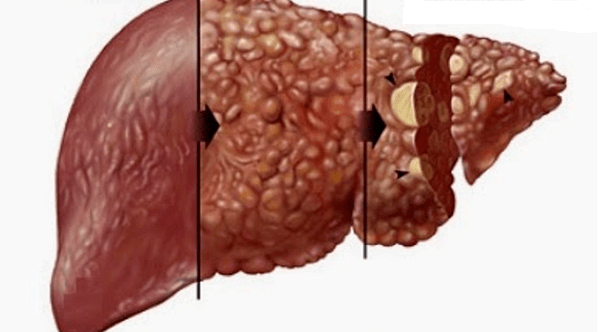
The effects of alcohol on the liver are completely devastating. Liver cells die as a result of alcohol, they are replaced by scars or adipose tissue, so that the organ cannot carry out its functions normally (toxins accumulate in the body and eventually poison it).
The most serious consequence of how alcohol is harmful to the human body with unmeasured intake is liver cirrhosis. With this disease, the structure of the organ begins to change, its size decreases, the blood vessels suffer from this: they shrink, the pressure in them increases, the blood stagnates. The natural result of this condition is rupture of the vessel wall and bleeding, which is the cause of many deaths.
Effects of alcohol on the brain
The effects of alcohol on the body mainly affect the brain. In a state of intoxication, a person’s cerebral cortex is destroyed, while gradually some parts of it become numb and die.
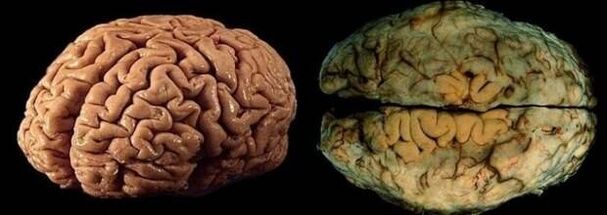
Those who like to drink alcohol, the brain changes - it becomes full of boils, scars and edema, blood vessels dilate, ruptures appear in some places, cysts appear in dead areas. This consequence once again proves the negative effects of alcohol in any dose on the human body.
Effects of alcohol on the nervous system and psyche
People who are addicted to alcohol need to know how alcohol affects the psyche. Drinking alcoholic beverages on a regular basis, especially in excessive doses, leads to the destruction of the soul. A person’s personality and behavior change completely, mental and moral deterioration begins. Alcohol and the nervous system interact to damage personality. The effects of alcohol on sleep can cause insomnia. There are other important consequences - mental disorders and violation of adequate perception of reality. Alcohol is harmful to memory, concentration, and motor coordination. This shows that the influence of alcohol on the human psyche causes great danger to the whole body.
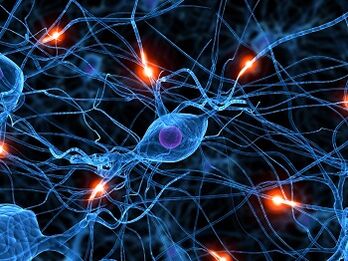
It is necessary to understand in more detail why alcohol is harmful to human mental health. The harmful effect of alcohol on the human body and the nervous system in particular is that nerve fibers are damaged and their conductivity worsens, in medicine such a violation is called polyneuritis. A person loses sensitivity to pain and temperature changes, there is numbness in the legs and arms, weakness and "satiety". Other symptoms: swelling, increased sweating, "chills" on the skin, itching and burning, sharp severe pain, the muscles look as tightened, as if they were pierced with a needle.
The most common effects of central alcohol system intake are:
- Tremors of delirium. It is necessary to know why such a situation is dangerous. It appears after prolonged cessation of alcohol use, accompanied by hallucinations, confusion, fever and chills, suicidal tendencies;
- Encephalopathy. Caused by severe vitamin B deficiency in people who drink chronically. Her symptoms are problems with the visual and vestibular apparatus, confusion;
- Alcoholic dementia syndrome. Loss of basic mental abilities, problems with calculation, speech, perception, concentration, memory;
- Alcoholic epilepsy. It manifests itself in seizures and convulsions in a state of hangover;
- Psychosis Korsakov. Loss of sensation in the limbs is combined with significant memory impairment.
Undoubtedly, the mental consequences of alcoholism deteriorate personality, the psychology of his behavior is disturbed.
Cardiovascular problems
Alcohol is harmful to the health and normal function of the heart muscle. Heart disease is one of the leading causes of death among drinkers.
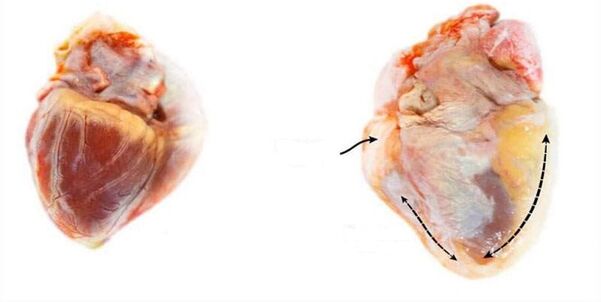
These muscle organs can expand profusely with frequent alcohol exposure. In addition, the consequences of alcohol in high doses are arrhythmias, increased risk of hypertension, myocardial infarction, stroke, ischemic damage to the heart muscle and atherosclerosis.
Kidneys and liquor
The kidneys are a very important organ. It acts as follows: removes fluids from the body, cleanses the blood of toxic substances, and participates in metabolic processes. Regular consumption of alcoholic beverages forces the kidneys to work at maximum.
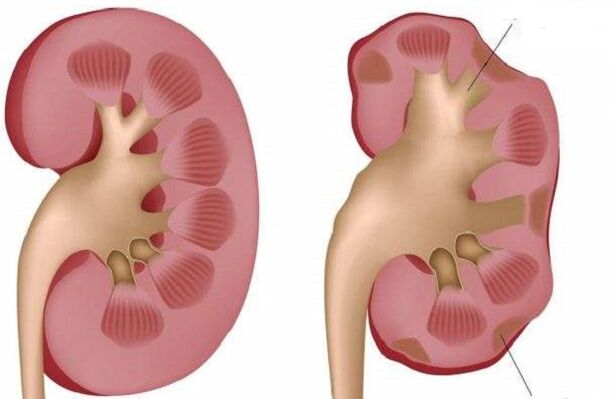
This threatens with a number of pathological conditions - dehydration, metabolic disorders, intoxication, the appearance of stones, pyelonephritis, the development of renal failure, inflammation of the urinary tract, the appearance of cancer.
How alcohol affects the digestive tract
Alcoholic beverages are toxic to the digestive system. The esophageal wall is affected, heartburn appears, the gag reflex increases, the ducts in the esophagus become thinner and wider, and during vomiting, rupture of the venous wall may occur, which will cause bleeding.
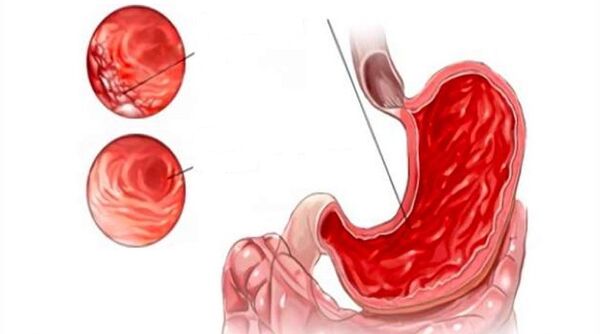
In addition, alcohol causes irreparable damage to the protective membrane of the stomach. The result is early aging of the organ, disruption of its function. Typical diseases of people who drink are gastritis, ulcers and even stomach cancer.
Effects of alcohol on immunity
Information on how alcohol affects immunity is twofold. Drinking in moderation can help you cope with the flu better. However, with more frequent alcohol intake, a person’s immunity is inhibited.
Lack of immunity is manifested in a decrease in the amount of special proteins - lysozymes, which are part of saliva, tears and other secretory secretions. This protein neutralizes harmful microbes that enter the body and prevents the development of various infectious diseases. Therefore, we can confidently assert that alcohol reduces immunity.
Effects of alcohol on joints and muscles
Muscle tissue is exposed to any dose of alcohol, which is very dangerous for muscle health. This slows or stops muscle growth completely, they atrophy, become flabby, alcohol can even destroy it completely. This can increase body fat storage. Alcohol and joints are not compatible concepts. The effects of alcohol on the health of the skeletal system are very significant, as it damages bone tissue, removes calcium out of the body, bones grow rapidly, become brittle, and fracture fragility. After drinking alcohol, the joints often ache.
Joint problems are common in the life of an alcoholic. People who drink often suffer from arthritis, inflammation of the formation of joints. Signs of arthritis: the joints begin to ache, especially the knees. After another party, the pain intensified.
Alcohol retains fluid in the body, edema appears, uric acid stops being excreted normally and accumulates in the form of salts that settle in the joints, which provokes the appearance of gout. Excess fluid enters the joints, presses on the walls of the articular cavity, touches the nerve fibers, pain appears in various joints after alcohol. Over time, due to the action of alcoholic beverages, deformation and complete destruction of the articular occurs.
How alcohol affects your appearance
Someone who is addicted to alcohol is easily recognizable in public. Typical Drinker Appearance:
- bluish nasal color;
- face redness and swelling;
- bags under the eyes;
- bruises from bruises or falls;
- slippery clothes;
- messy hair.
The effects of alcohol on the skin are also negative. A red color appears, which is explained by an increase in blood flow under the influence of alcohol. A large load on the vessel causes its damage, small capillaries rupture, this causes bruises in the form of blue and red dots on the face. The bluish color is the result of severe vascular damage, the blood does not supply oxygen in this area well.

To remove alcohol from the body, a large amount of fluid is involved, dehydration enters, a person who has consumed a lot of alcohol feels a strong thirst, trying to get rid of it. Fluid accumulates and is expelled slowly, as the body strives to protect itself from repeated dehydration and makes water retention, from which the face and other parts of the body swell.
Effects of alcohol on the endocrine system
Alcohol and its effects on human health are also linked to the work of the hormonal system. The main organs:
- Thyroid gland (regulates metabolism);
- The pituitary and hypothalamic glands (control the work of the entire system);
- Pancreas (responsible for insulin production);
- Pineal gland (produces hormones that affect sleep, blood circulation and nervous system);
- The adrenal glands (produce adrenaline);
- Thymus (regulates the growth and development of immune cells);
- Gonads (produce male and female hormones).
The effects of alcohol on the thyroid gland and other organs of the endocrine system are such that it lowers the production of some hormones and increases the production of others. For example, in men there is a predominance of female hormones and a decrease in male hormone levels. For women who drink, the opposite happens. Hormonal disorders adversely affect the overall state of the organism. Some endocrine pathologies are associated with congenital gene mutations, and these mutations also often arise as a result of drinking too much alcohol. The interaction of alcohol and the normal thyroid gland, as well as other endocrine organs, is impossible.
How alcohol can affect the spleen
Often, the spleen hurts as a result of frequent alcohol consumption. This organ acts as a carrier of old and damaged blood cells in the body. This is a "warehouse" of blood storage, which, if necessary, supplies the channels of the circulatory system. In addition, this organ cleanses the blood of pathogenic microorganisms.

Pain in the left hypochondrium may indicate a spleen problem caused by excessive drinking. It is very easy to explain why alcohol intake is dangerous and why the spleen hurts. Often, these organs are enlarged, splenic infarction, abscesses, in severe cases requiring removal of these organs, may also occur. Consequences of excessive alcohol intake can disrupt spleen function and result in death.
Effects on the respiratory system
Drinkers should be aware of how alcohol affects lung health. Alcohol vapor affects the respiratory mucosa, which contributes to the development of pneumonia, bronchitis, chronic pharyngitis and laryngitis (hence the hoarse voice of a drunkard). Moreover, the disease is difficult and long-term. Pneumonia can progress to pneumosclerosis (hardened lung tissue). Alcohol in the blood causes the destruction of lung tissue and the development of their pathology (emphysema).
In the example of the lungs, one can see what causes alcohol to be harmful to the human body. Large doses of alcohol interfere with the respiratory activity of the lungs, in some cases, breathing can stop completely. Delirium tremors are often accompanied by inflammation and pulmonary edema. There is also a link between alcohol and the occurrence of lung cancer.
Effects of alcohol on human vision
Not everyone knows for sure whether alcohol is harmful to eyesight, and why alcoholics suffer from eye pain. Under the influence of alcohol, intracranial pressure increases. This causes damage to the eye canals and minor bleeding, oxygen supply to the muscles is disrupted, they are in a state of permanent tension. Consequences of this condition can be atrophy of the eyeball muscles and deterioration of the quality of vision.
In addition, alcohol can affect the fundus nerve fibers, interfering with the function of the optic nerve. The most serious effect of alcohol on the visual system is blindness.
Alcoholism and its consequences have a devastating effect on the body, and the soul can also change significantly. Only by stopping drinking can you stop the process of destruction of your body.































